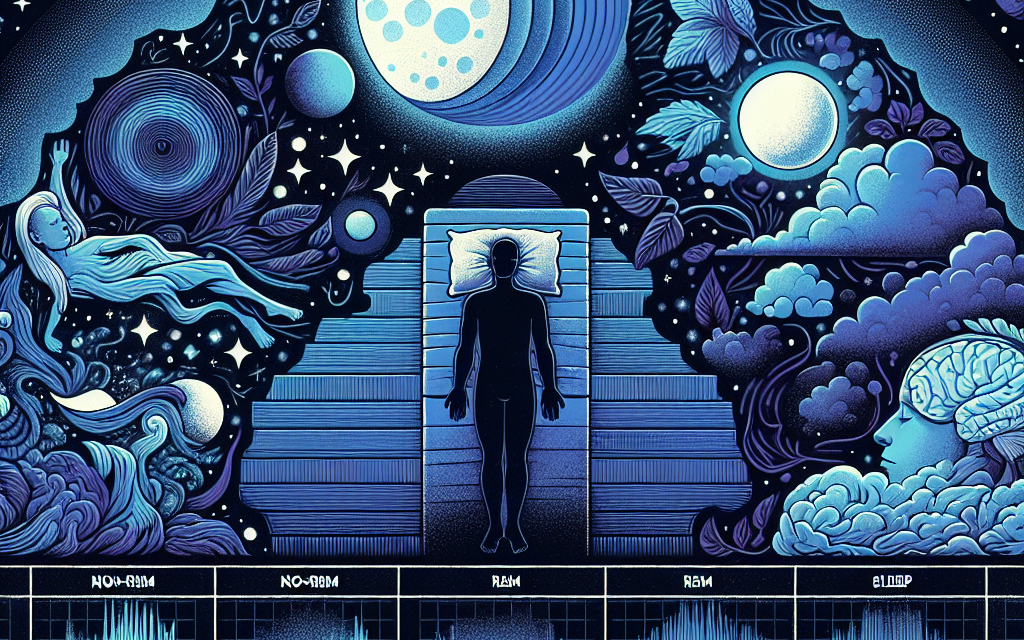The Importance of REM and Non-REM Sleep Explained
Sleep is a fundamental aspect of human health and well-being, yet it is often overlooked in our fast-paced lives. Understanding the different stages of sleep, particularly REM (Rapid Eye Movement) and Non-REM sleep, is crucial for appreciating their roles in physical health, mental well-being, and overall quality of life. This article delves into the significance of these two sleep stages, exploring their functions, impacts on health, and the consequences of sleep deprivation.
Understanding Sleep Stages
Sleep is not a uniform state; rather, it consists of several stages that cycle throughout the night. These stages are broadly categorized into Non-REM and REM sleep. Each stage plays a unique role in maintaining our physical and mental health.
What is Non-REM Sleep?
Non-REM sleep is divided into three stages, each characterized by distinct brain wave patterns and physiological changes. The stages are:
- Stage 1: This is the lightest stage of sleep, lasting only a few minutes. During this stage, the body transitions from wakefulness to sleep, and it is easy to be awakened.
- Stage 2: This stage accounts for about 50% of total sleep time. Heart rate slows, body temperature drops, and brain waves become slower with occasional bursts of rapid waves known as sleep spindles.
- Stage 3: Also known as deep sleep or slow-wave sleep, this stage is crucial for physical recovery and growth. It is difficult to awaken someone in this stage, and it is characterized by delta waves in the brain.
What is REM Sleep?
REM sleep is the stage where most dreaming occurs. It typically begins about 90 minutes after falling asleep and recurs multiple times throughout the night, with each episode getting longer. During REM sleep:
- The brain is highly active, resembling wakefulness.
- Muscle atonia occurs, meaning the body is essentially paralyzed to prevent acting out dreams.
- Heart rate and breathing become irregular.
Understanding these stages is essential for recognizing their importance in our overall health.
The Role of Non-REM Sleep in Physical Health
Non-REM sleep plays a vital role in various physiological processes that are crucial for maintaining physical health. This section explores how Non-REM sleep contributes to bodily functions, recovery, and overall well-being.
Physical Restoration and Recovery
One of the primary functions of Non-REM sleep, particularly deep sleep (Stage 3), is physical restoration. During this stage, the body undergoes several restorative processes:
- Cell Repair: Growth hormone is released during deep sleep, facilitating tissue growth and muscle repair. This is particularly important for athletes and individuals recovering from injuries.
- Immune Function: Non-REM sleep enhances immune function. Studies have shown that sleep deprivation can lead to a decrease in immune response, making individuals more susceptible to infections.
- Energy Restoration: Non-REM sleep helps replenish energy stores in the body, preparing individuals for the day ahead.
Research indicates that individuals who consistently get adequate Non-REM sleep experience better physical health outcomes. For instance, a study published in the journal “Sleep” found that individuals who reported poor sleep quality had a higher risk of developing chronic conditions such as obesity, diabetes, and cardiovascular diseases.
Impact on Hormonal Balance
Non-REM sleep significantly influences hormonal balance in the body. Hormones such as cortisol, insulin, and leptin are affected by sleep quality and duration:
- Cortisol: This stress hormone typically peaks in the morning and decreases throughout the day. Poor sleep can lead to elevated cortisol levels, contributing to stress and anxiety.
- Insulin: Sleep deprivation can impair insulin sensitivity, increasing the risk of type 2 diabetes. A study found that individuals who slept less than six hours per night had a 30% higher risk of developing diabetes.
- Leptin and Ghrelin: These hormones regulate appetite. Lack of sleep can lead to decreased leptin (which signals satiety) and increased ghrelin (which stimulates hunger), contributing to weight gain.
Maintaining a healthy balance of these hormones is crucial for metabolic health and weight management.
Memory Consolidation and Learning
Non-REM sleep is essential for memory consolidation and learning. During this stage, the brain processes and organizes information acquired throughout the day:
- Declarative Memory: Non-REM sleep, particularly slow-wave sleep, is critical for consolidating declarative memories (facts and information). Studies have shown that individuals who get adequate Non-REM sleep perform better on memory tasks.
- Skill Learning: Motor skills and procedural memories are also enhanced through Non-REM sleep. Research indicates that practicing a skill before sleep can lead to improved performance after a night of good sleep.
Inadequate Non-REM sleep can hinder cognitive function, leading to difficulties in learning and memory retention. A study published in “Nature” found that sleep-deprived individuals had impaired memory recall and cognitive performance.
Emotional Regulation and Mental Health
Non-REM sleep plays a significant role in emotional regulation and mental health. It helps process emotions and experiences, contributing to psychological resilience:
- Emotional Processing: During Non-REM sleep, the brain processes emotional experiences, helping individuals cope with stress and anxiety. This processing is crucial for maintaining emotional balance.
- Mood Regulation: Adequate Non-REM sleep is associated with improved mood and reduced risk of mood disorders such as depression and anxiety. Studies have shown that individuals with insomnia are at a higher risk of developing these conditions.
In contrast, chronic sleep deprivation can lead to increased irritability, mood swings, and heightened emotional reactivity. A study published in “JAMA Psychiatry” found that individuals with sleep disorders had a significantly higher prevalence of anxiety and depression.
Consequences of Non-REM Sleep Deprivation
The consequences of inadequate Non-REM sleep can be severe and far-reaching. Chronic sleep deprivation can lead to a host of physical and mental health issues:
- Increased Risk of Chronic Diseases: As mentioned earlier, poor Non-REM sleep is linked to obesity, diabetes, and cardiovascular diseases.
- Cognitive Impairment: Lack of Non-REM sleep can lead to difficulties in concentration, decision-making, and problem-solving.
- Emotional Disturbances: Chronic sleep deprivation can exacerbate anxiety and depression, leading to a vicious cycle of poor sleep and mental health issues.
Addressing Non-REM sleep deprivation through lifestyle changes, such as improving sleep hygiene and managing stress, is essential for overall health and well-being.
The Role of REM Sleep in Mental Health
While Non-REM sleep is crucial for physical restoration, REM sleep plays a vital role in mental health and cognitive function. This section explores the significance of REM sleep in emotional regulation, creativity, and overall mental well-being.
Emotional Regulation and Processing
REM sleep is essential for emotional regulation and processing. During this stage, the brain engages in complex activities that help individuals cope with emotional experiences:
- Dreaming: Most dreaming occurs during REM sleep, allowing individuals to process emotions and experiences. Dreams can serve as a form of emotional therapy, helping individuals work through unresolved issues.
- Stress Reduction: REM sleep has been shown to reduce stress levels. A study published in “Psychological Science” found that individuals who experienced REM sleep after a stressful event had lower levels of stress hormones compared to those who did not.
By facilitating emotional processing, REM sleep contributes to psychological resilience and overall mental health.
Cognitive Function and Creativity
REM sleep is also linked to cognitive function and creativity. During this stage, the brain engages in complex neural activity that enhances problem-solving and creative thinking:
- Memory Consolidation: REM sleep plays a crucial role in consolidating procedural memories and skills. Research has shown that individuals who get adequate REM sleep perform better on tasks requiring creativity and innovation.
- Insight and Problem-Solving: REM sleep has been associated with the ability to make connections between seemingly unrelated concepts, leading to insights and breakthroughs. A study found that participants who napped and entered REM sleep were more likely to solve complex problems than those who did not.
Inadequate REM sleep can hinder cognitive performance, leading to difficulties in creativity and problem-solving.
Impact on Mental Health Disorders
REM sleep is closely linked to mental health disorders. Disruptions in REM sleep patterns have been observed in individuals with various psychiatric conditions:
- Depression: Individuals with depression often experience altered REM sleep patterns, including increased REM density and earlier onset of REM sleep. Addressing these disruptions can be crucial for effective treatment.
- Anxiety Disorders: REM sleep disturbances have been linked to anxiety disorders. Improving REM sleep quality can help alleviate symptoms of anxiety.
Understanding the relationship between REM sleep and mental health can inform treatment approaches for individuals struggling with these conditions.
REM Sleep and Learning
REM sleep is essential for learning and memory consolidation. During this stage, the brain processes and integrates new information:
- Language Acquisition: Research has shown that REM sleep plays a crucial role in language learning. A study found that individuals who had REM sleep after learning new vocabulary performed better on recall tests.
- Skill Learning: REM sleep enhances the retention of motor skills. Athletes often benefit from REM sleep after practicing their skills, leading to improved performance.
Inadequate REM sleep can hinder learning and memory retention, making it essential for students and professionals alike to prioritize quality sleep.
Consequences of REM Sleep Deprivation
The consequences of REM sleep deprivation can be profound and detrimental to mental health:
- Cognitive Impairment: Lack of REM sleep can lead to difficulties in concentration, memory recall, and decision-making.
- Emotional Disturbances: Chronic REM sleep deprivation can exacerbate symptoms of anxiety and depression, leading to a cycle of poor mental health.
- Increased Stress Levels: REM sleep helps regulate stress hormones. Without adequate REM sleep, individuals may experience heightened stress and anxiety.
Addressing REM sleep deprivation through lifestyle changes, such as improving sleep hygiene and managing stress, is essential for maintaining mental health.
The Interplay Between REM and Non-REM Sleep
While Non-REM and REM sleep serve distinct functions, they are interconnected and work together to promote overall health and well-being. This section explores the interplay between these two sleep stages and their combined effects on physical and mental health.
Sleep Cycles and Their Importance
Throughout the night, individuals cycle through Non-REM and REM sleep multiple times, with each cycle lasting about 90 minutes. The structure of these cycles is crucial for optimal health:
- Balanced Sleep Architecture: A healthy sleep architecture includes a balance of Non-REM and REM sleep. Disruptions to this balance can lead to negative health outcomes.
- Adaptation to Stress: The interplay between Non-REM and REM sleep helps individuals adapt to stressors. Non-REM sleep restores the body, while REM sleep processes emotional experiences.
Maintaining a healthy sleep cycle is essential for overall well-being.
Impact on Physical Health
The interplay between REM and Non-REM sleep has significant implications for physical health. For instance:
- Weight Management: Both REM and Non-REM sleep influence hormonal balance, affecting appetite regulation and metabolism. Poor sleep quality can lead to weight gain and obesity.
- Cardiovascular Health: Adequate sleep, including both REM and Non-REM stages, is associated with lower blood pressure and reduced risk of cardiovascular diseases.
Understanding the relationship between these sleep stages can inform strategies for improving physical health.
Impact on Mental Health
The interplay between REM and Non-REM sleep is also crucial for mental health. For example:
- Stress Resilience: Non-REM sleep restores the body, while REM sleep helps process emotions. Together, they contribute to psychological resilience and coping mechanisms.
- Mood Regulation: A balance of both sleep stages is essential for mood regulation. Disruptions in either stage can lead to increased irritability and mood swings.
Prioritizing both REM and Non-REM sleep is essential for maintaining mental health.
Strategies for Improving Sleep Quality
To optimize the benefits of both REM and Non-REM sleep, individuals can implement several strategies:
- Establish a Sleep Routine: Going to bed and waking up at the same time each day helps regulate the body’s internal clock.
- Create a Sleep-Friendly Environment: A dark, quiet, and cool bedroom promotes better sleep quality.
- Avoid Stimulants: Limiting caffeine and nicotine intake, especially in the hours leading up to bedtime, can improve sleep quality.
- Manage Stress: Practicing relaxation techniques, such as meditation or deep breathing, can help reduce stress and improve sleep quality.
Implementing these strategies can enhance both REM and Non-REM sleep, leading to improved overall health.
The Future of Sleep Research
As our understanding of sleep continues to evolve, future research will likely focus on the intricate relationship between REM and Non-REM sleep. Potential areas of exploration include:
- Sleep Disorders: Investigating the impact of sleep disorders on the balance between REM and Non-REM sleep can inform treatment approaches.
- Technology and Sleep: Exploring how technology affects sleep patterns and quality will be crucial in our increasingly digital world.
- Personalized Sleep Interventions: Developing personalized interventions based on individual sleep patterns may enhance treatment outcomes for sleep-related issues.
Continued research will deepen our understanding of the importance of both REM and Non-REM sleep in promoting health and well-being.
Conclusion
In conclusion, both REM and Non-REM sleep are essential for maintaining physical health, mental well-being, and overall quality of life. Non-REM sleep plays a crucial role in physical restoration, hormonal balance, memory consolidation, and emotional regulation. Meanwhile, REM sleep is vital for emotional processing, cognitive function, creativity, and mental health. The interplay between these two sleep stages highlights the importance of achieving a balanced sleep architecture for optimal health outcomes.
As we navigate our busy lives, prioritizing sleep should be a fundamental aspect of our health routines. By understanding the significance of REM and Non-REM sleep, we can take proactive steps to improve our sleep quality, leading to enhanced physical health, better emotional regulation, and improved cognitive function. Ultimately, investing in our sleep is an investment in our overall well-being.





